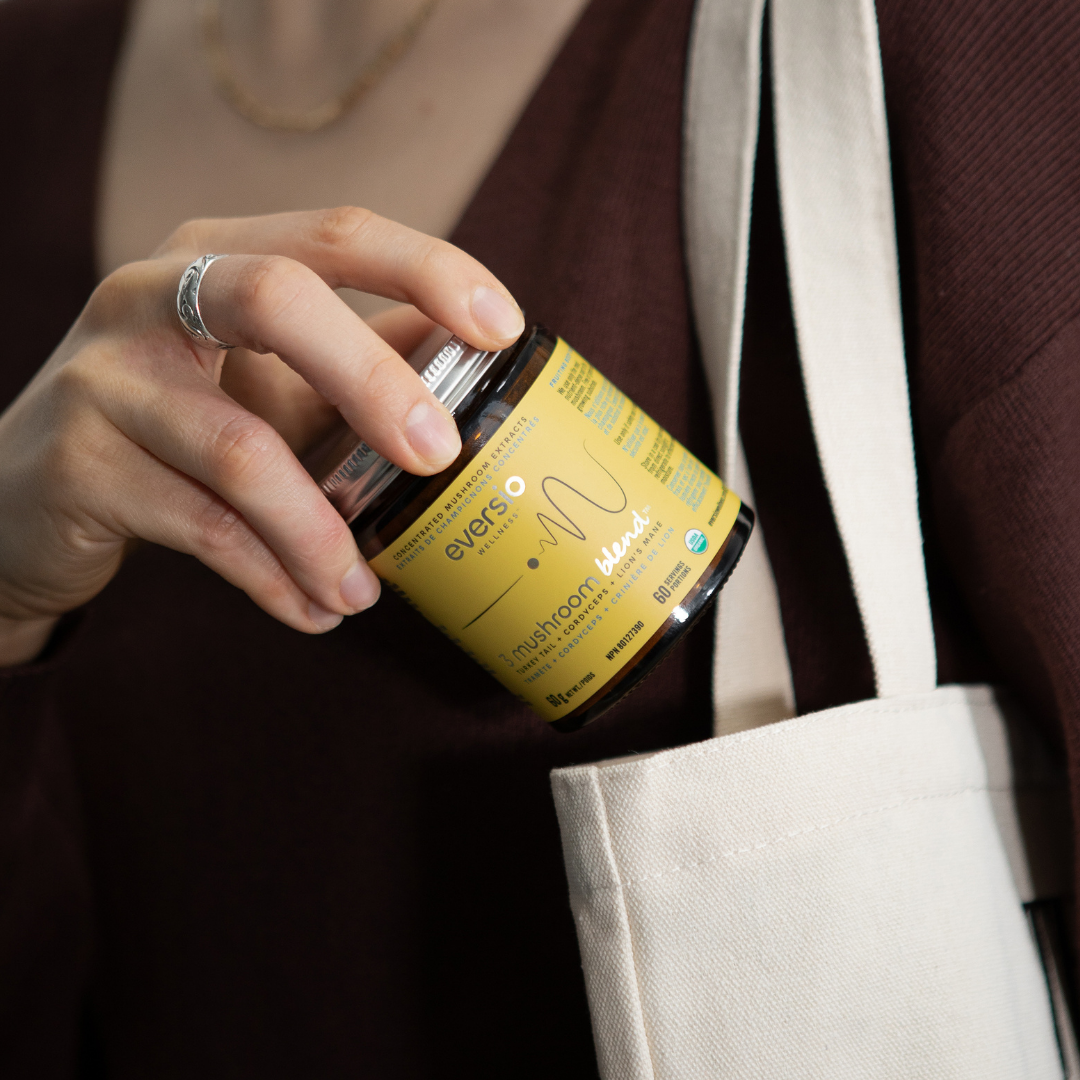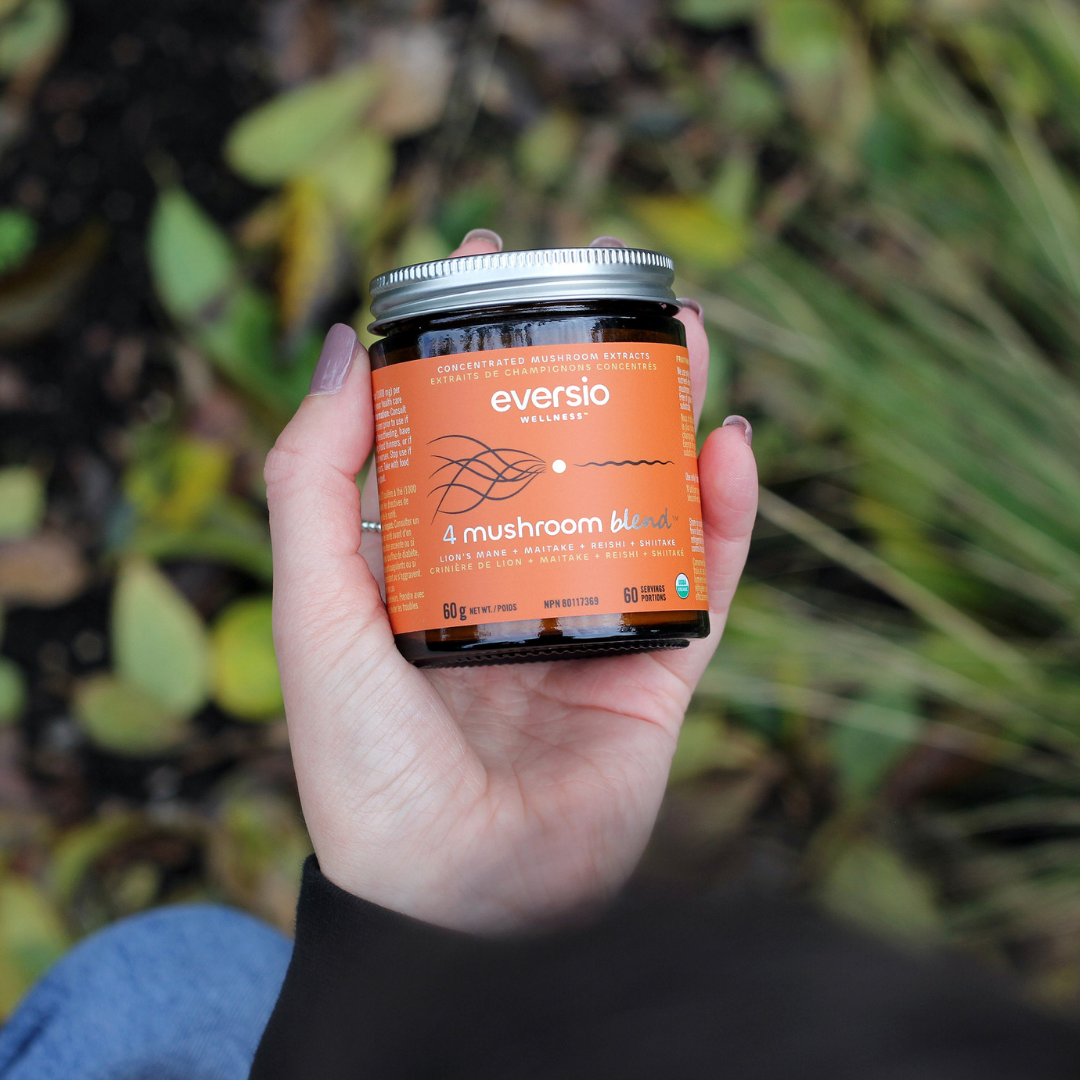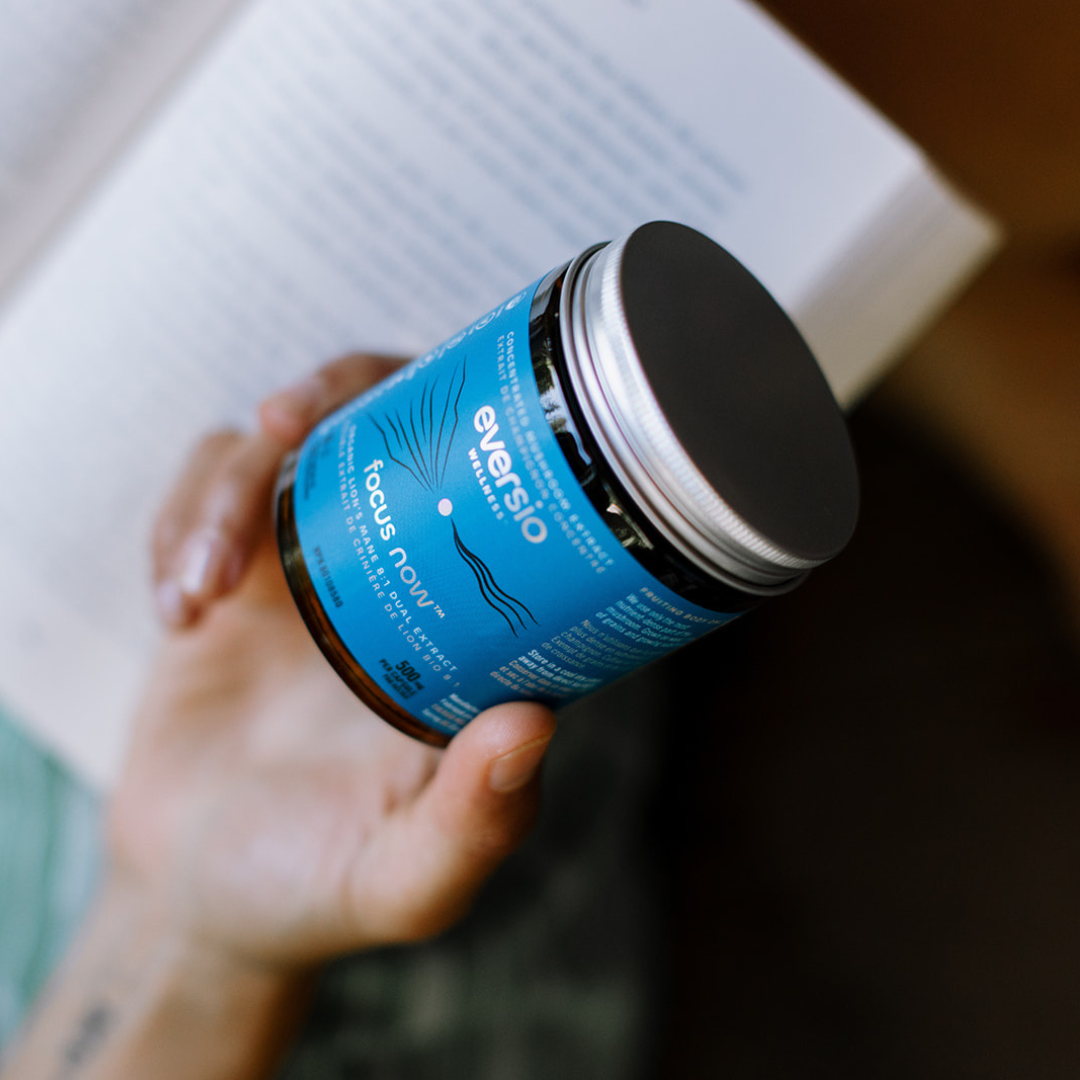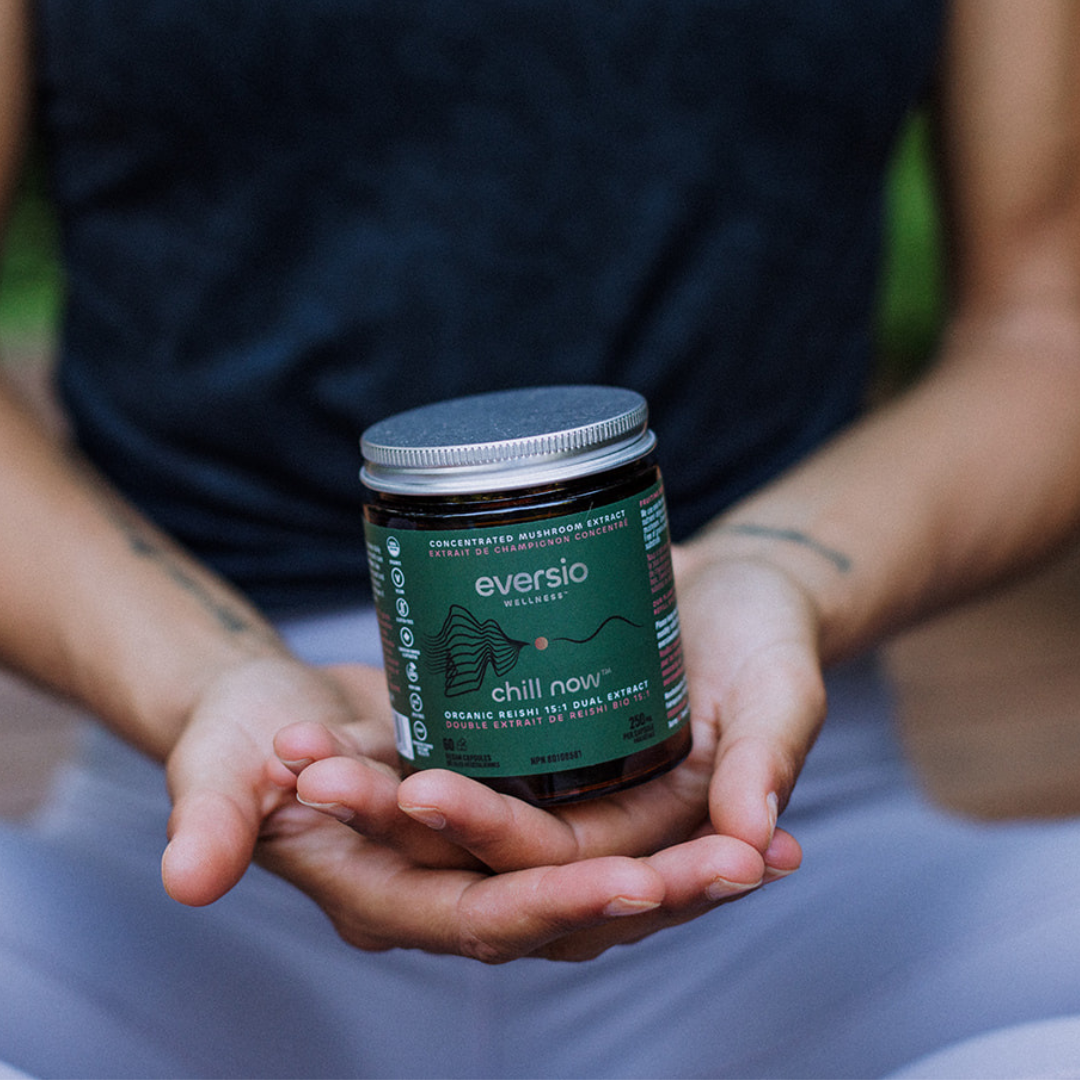Top 5 Health Concerns for Seniors — And How Functional Mushrooms & Simple Habits Help
If you love a good Top 5, this one’s for you—especially if you are a senior or you care for one.
In Episode 28 of The Eversio Experience, we dug into the five biggest levers for quality of life as we age:
- Cognitive health and memory
- Immune resilience
- Heart and metabolic health
- Sleep and mood
- Mobility, strength, and fall risk
These aren’t just buzzwords; they’re where daily choices and small, repeatable habits deliver huge returns. We also shared where functional mushroom fruiting body extracts fit as adjuncts—never replacements—for the basics like movement, nutrient‑dense food, social connection, and good sleep hygiene.
Below, you’ll find practical routines, research‑backed insights, and senior‑friendly tips you can use today.
Reminder: Talk with your healthcare provider before making changes, especially if you’re managing multiple prescriptions (polypharmacy). We include interaction considerations and quality pointers near the end.
1) Cognitive Health & Memory
The Boring Basics That Work (Do These First)
Move daily: Brisk walking counts. Add light strength 2x/week (yes, chair-based is great).
Know your numbers: Keep an eye on blood pressure at home.
Eat Mediterranean-style: Plant‑forward, whole‑food plates with olive oil as your main fat; seafood a couple times per week; fermented dairy in moderation; red meat/sweets as “sometimes” foods; herbs/spices for flavor; and meals enjoyed socially.
What a Mediterranean Plate Looks Like
½ plate: non‑starchy vegetables + mushrooms
¼ plate: whole grain or starchy veg (e.g., quinoa, potatoes)
¼ plate: protein (fish, legumes, eggs, poultry)
Finish: drizzle of olive oil + handful of nuts or seeds
Stay socially & mentally engaged: Think Scrabble, Sudoku, cards, club nights—anything that keeps brain circuits firing and wiring.
Protect sleep (we’ll go deep in Chapter 4).
Dance: The Secret Brain Workout
Frequent social dancing is linked with a lower risk of dementia and can increase hippocampal volume (the memory center), outperforming some conventional fitness programs because choreography adds a cognitive challenge.
Mushroom Adjuncts for Brain Health
Lion’s Mane (Hericium erinaceus) — the “brain mushroom.” Human data in older adults with mild cognitive impairment showed improved cognitive testing over 16 weeks, which regressed after stopping—suggesting benefits require consistency. Look for dual‑extracted fruiting body (standardized for hericenones/related compounds).
Cordyceps (C. militaris) — known for energy, but its bioactives (e.g., cordycepin, adenosine) act on A2A adenosine receptors tied to attention, motivation, and sleep regulation, with neuroprotective/anti‑inflammatory actions in preclinical research. Pairs beautifully with lion’s mane for mental energy + plasticity.
2) Immune Resilience
Older adults face higher risks from respiratory viruses (flu, RSV, COVID). Prevention and resilience matter.
- Rhythm Builds Resilience
- Protein + fiber at meals for steady immunity
- Consistent sleep and stress management (try 5–10 minutes of breath work or meditation)
- Walking habit: Immune systems love routine
- Culinary & Supplemental Mushroom Allies
Shiitake (food or extract): Four‑week diet studies with whole dried shiitake showed increased secretory IgA, activation of immune lymphocytes, and lower CRP (inflammation marker).
Maitake (food or extract): In adults 60+, maitake fruiting‑body tablets around flu vaccination improved antibody responses and reduced common-cold symptoms.
Turkey Tail: Rich in beta‑glucans with immune‑modulating (balanced up/down) effects via Dectin‑1 and CR3 pathways; acts as a prebiotic, supporting gut microbes and butyrate production—key for mucosal and systemic immunity.
Kitchen tip: Cook with shiitake/maitake 4–7 times a week for umami that lets you reduce salt and boost fiber.
3) Heart & Metabolic Health
Heart disease remains the leading cause of death in North America. The good news? The fundamentals are powerful and mushrooms complement them.
Anchors That Move the Needle
- Mediterranean‑style eating (plants first, olive oil, seafood)
- Walk after meals (blunts post‑meal glucose spikes)
- 2x/week resistance training (protects muscle and insulin sensitivity)
- Regular BP checks and routine labs
- Mushrooms That Fit the Cardio‑Metabolic Picture
Reishi (Ganoderma lucidum) dual extract, rich in triterpenes (e.g., ganoderic acids): Traditionally used to tonify heart/lung Qi and calm Shen (stress balance). Modern research aligns with improved perceived well‑being and stress terrain, helpful for cardio‑metabolic balance.
Shiitake: Human research links intake with healthier cholesterol and inflammation profiles—think lipid balance support.
Maitake: Emerging clinical data suggests support for post‑meal glucose and insulin dynamics—very relevant for insulin resistance and weight stability.
Further listening: Episode 27 “All About Maitake & Metabolic Health.”
Real-life: “Fun cardio” counts. Yes, wake surfing, dancing, gardening, or brisk nature walks—anything that makes you breathe, balance, and smile.
4) Sleep & Mood
Aging can bring lighter sleep, more awakenings, and less REM. That cascades into energy, mood, and cognitive performance.
- Sleep Hygiene That’s Actually Doable
- Consistent sleep/wake window (even on weekends)
- Morning daylight in your eyes (don’t stare at the sun; just get outdoors)
- Move most days (a.m. walks are great; light evening stretching helps)
- Cut late‑day caffeine (half‑life ~8 hours)
- Limit evening alcohol
Address pain and nocturia (consider earlier fluid cut‑off; discuss options with your clinician)
Swap the nightcap: Keep the cozy ritual with caffeine‑free herbal tea (peppermint, Bengal spice, chamomile).
Mushroom Adjuncts for Better Nights
Reishi: Dual‑extracted fruiting‑body reishi (triterpene‑rich) shows sedative‑like effects—shorter sleep latency (less tossing) and longer sleep time. The ethanol step of dual extraction concentrates those triterpenes.
Lion’s Mane: A small pilot in women with sleep issues found improved Pittsburgh Sleep Quality Index and well‑being after four weeks of fruiting‑body extract; other trials show reduced anxiety/depression scores. Calms “wired but tired,” often making it easier to fall and stay asleep.
How to pair: Morning/early‑afternoon lion’s mane for focus + evening reishi to wind down.
5) Mobility, Strength & Fall Risk
One in four older adults reports a fall each year, and falls remain the leading cause of injury in seniors. Independence hinges on strength, balance, vision, and environment.
A Minimalist Strength Plan (Home‑Friendly)
- Chair stands: 2–3 sets of 6–10 reps 2–3x/week
- Step‑ups (use a stair): 2–3 sets of 6–10 reps/leg
- Calf raises: 2–3 sets of 10–15 reps
- Daily walk: even 10–20 minutes adds up
- The Tandem Stance Balance Drill (Clinician‑Approved)
- Stand beside a sturdy counter or chair for safety.
- Place one foot heel‑to‑toe in front of the other on a straight line.
- Soften knees, stand tall, lightly brace your core, and fix your gaze on a point ahead.
- Let go and hold 10–30 seconds. Switch lead foot.
- Perform 2–3 holds per side.
- Getting beyond 10 seconds is a great sign.
- Practice most days.
Environment & Vision: The “Five‑Minute Home Sweep”
- Remove loose rugs and cord trip hazards
- Improve lighting (especially pathways and bathrooms)
- Check footwear grip
- Update eyeglass prescriptions
- Ask your clinician for a medication review (dizziness, hypotension)
How Mushrooms Help
Sleep + calm = better balance practice: Evening reishi; daytime lion’s mane for focus.
Consistency: Shiitake/maitake support immune tone—fewer colds → fewer skipped strength/walk sessions.
Energy: Morning cordyceps can lift perceived stamina for walks and light resistance.
Weight & joints: Cooking with mushrooms adds umami so you can reduce salt/fat and support blood pressure/weight—both tied to steadier gait.
Nerve support: Lion’s mane for mental clarity/attention during balance work.
Bone health: Sun‑exposed culinary mushrooms can boost vitamin D—pair with calcium, magnesium, and strength training.
Gut health: Beta‑glucans act as prebiotics, supporting recovery and systemic balance.
Practical target: Eat mushrooms (shiitake, maitake, lion’s mane, oyster) 4–7 times weekly, plus 2–3 lower‑body strength sessions and 3–5 short balance practices each week.
Putting It Together: A Week of Simple Wins
Here’s a senior‑friendly blueprint you can repeat and adapt:
Daily (Mon–Sun)
Morning: 10–20 minutes outdoor walk + lion’s mane (focus/clarity).
Midday: Mediterranean‑style plate (½ veg + mushrooms, ¼ grain/starch, ¼ protein).
Afternoon: Tandem stance 2–3 holds/side (or single‑leg balance with support).
Evening: Herbal tea ritual, reishi 30–60 minutes before bed; devices dimmed.
Mon / Thu
Home strength (15–25 minutes): chair stands, step‑ups, calf raises; optional light dumbbells or resistance band.
Tue / Fri
Social brain time: cards, Scrabble, or dance class (yes!). Call a friend or grandchild.
Wed / Sat
Kitchen play: cook with shiitake/maitake; try a new herb/spice. Short after‑meal walk.
Sun
Reset: Prep veggies, batch‑cook a mushroom‑rich stew, check BP, review meds/supps, confirm medical appointments, and plan next week’s movement.
Safety, Quality & What to Look For
Choose fruiting body–only extracts from reputable producers.
Look for dual extraction (water + ethanol) when triterpenes matter (e.g., reishi, lion’s mane hericenones).
Avoid mycelium-on-grain products when your goal is fruiting‑body actives; labels should state “fruiting body” clearly.
Interactions: If you take blood thinners, antihypertensives, diabetes meds, immunosuppressants, or multiple prescriptions, consult your clinician.
Final Word: Connection Is Medicine
Social connection lowers loneliness and depression, supports sharper thinking, and is linked with a reduced risk of cognitive decline, heart disease, and early mortality. It’s also a safety net: the people who see you regularly notice changes sooner. Build yours with calls, classes, clubs, volunteering, and shared meals.
Your mini‑mission this week:
Take a 10‑minute walk today.
Call a friend.
Cook something colorful (mushrooms included) :)























Leave a comment
All comments are moderated before being published.
This site is protected by hCaptcha and the hCaptcha Privacy Policy and Terms of Service apply.